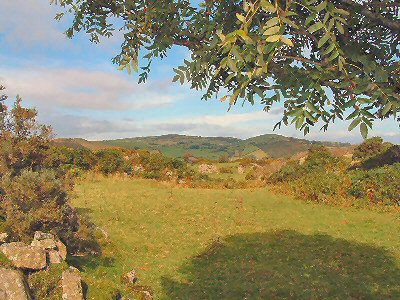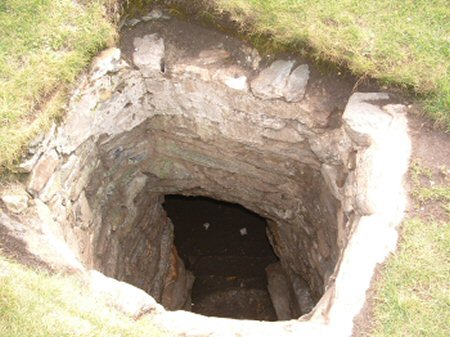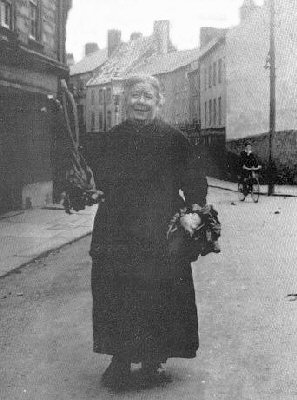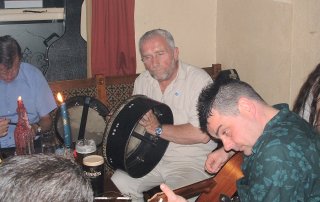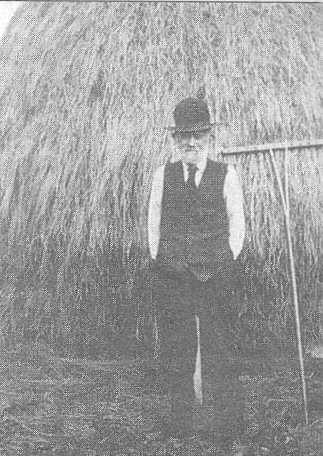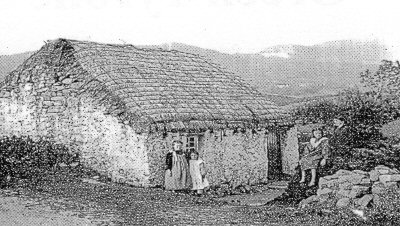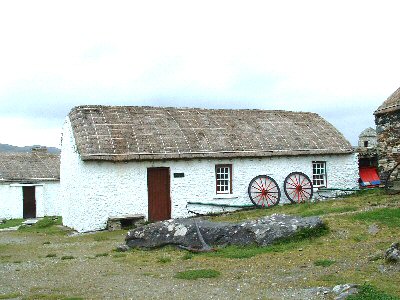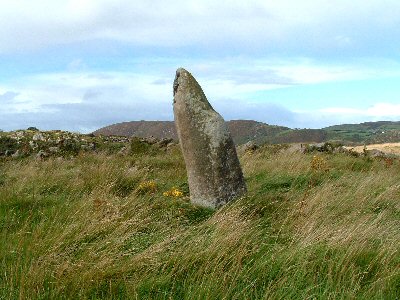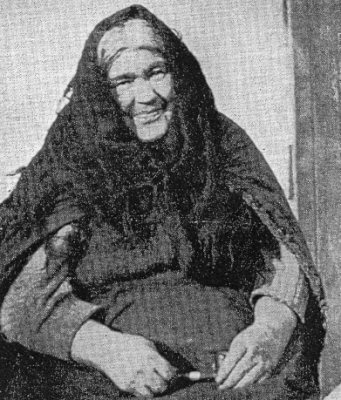The second Dromintee man read that Book of Harry Stotle and it got a hault of him and he couldn’t get shot of it. He did in the end, wi’ the help of a Father Duggan – a silenced priest. Somehow they had more power.
Folklore
The Book of Harry Stotle
There’s them kin work the Black Art of the Divil and there’s not a word of lie in that. It cud be done before and it can still be done. I heared a priest in Dundalk the other week preaching that it cud be done!
There’s several ways of doing it. A man cud sell his soul to the devil and be free and rich and merry for seven years and then the devil wud come till claim him. But he cud make the devil sweep the bottom of the seven seas for him before he’d go and all the time the money pouring out of the tops of he’s boots.
There was some way of swearing on an anvil in a blacksmith’s forge. Sure Willy the Wisp was a blacksmith in the first place that sold himself till the Divil an’ beat him in the end. An’ they cud hold up the Ace of Hearts at the Consecration of the Mass and they’d get the Black Art. Or gather the seeds of the bracken on black plates on Hallow Eve at midnight. And ye cud read some book that came from foreign parts: it was a book with black pages and white writing and you had to read it from back to front and from right till left. They called it the Book of Harry Stotle. And it warned you
‘Read me through
Peruse me not
Or Hell’s Fire
Will be your lot.’
Sure I’ll tell ye more the next time ye call on your ceili!
Whistlin’ In The Barn
Peader was reflecting on days and people, and a way of life that were gone. He spoke of a travelling woman of these parts who stayed in his parent’s place one time, and who took over the settlebed and made the people ‘wait hand and foot’ on her for a week.
She was nothing to the old Travelling Woman who was snow-bound in his grandfather’s on the Dromintee Old Road. She had her own flour with her, which she had begged. When given permission to make her own griddle of bread she told the grandfather at the fireside to ‘quit yer smokin’ and spittin” while she was around the hearth. She backed this up with the remark that she had ‘once owned three cows in the County of Monaghan’. War ensued in which even the cat – and the traditional South Armagh hospitality – fled. Out she had to go into the snow-drifts.
The grandmother couldn’t have this and pleaded for a compromise that allowed the travelling woman a temporary banishment only to the barn. She began loudly to play a tin whistle out there so that the neighbours might learn of her banishment. He saw the gathering throng of spectators on the ten-foot drifts on the road overlooking the wall and the fear of local ridicule caused him to relent. She was brought back to the house.
Customs
Blessed Candles were once tied onto the tail of milch cows on Hallow Eve. People firmly believed that evil spirits were abroad and they had to protect their most prized animal.
The Spadesman
Mick was a true spadesman and in his hands that tool acted like something bewitched. He never put a foot to it.
Annie’s Shop: 2
I usually went to Annie’s Huckster Shop with a companion, who always left the door open, deliberately.
Annie’s Shop: 3
After the serving came the reckoning, interspersed with acidy queries about people, children with chin-cough, a christening or a wake, laying hens – or a sudden and arresting cry after a departing customer,
In The Forth
In the fort one time there was a lone bush so large and branchy, ye cud have stud under it all day in the rain without iver getting’ wet. About a ton of stones lay aroun’ it near till the size of ducks’ eggs, but what they wur there for nobody knowed. The tree itself wus blown down on the windy night an’ carried right across the fiel’s to the road. But nivir a sowl laid han’s on it or touched it until it wasted away of itself.
Near the same fort too, just outside the ring, there wus at one time the finest pillar-stone in Ireland, but oul’ Mrs Rice had it destroyed. An’ it wus she had the bad luck, all her cows dyin’ of disorders, an’ she claimin’ compensation off two townlan’s an’ blackguardin’ her dacent neighbours.
But the same Mrs Rice, she went too far when she cut down the oul’ thorns on the fort. But God rest her, she cud nivir see the harm in it. She nivir saw another winter!
The fort was always a gentle place. I mind me father that’s dead this many a year – he’d be a hundred today if he wus alive – hearing the finest music there that iver wus heared. Deed the finest music that iver wus heared wus nothin’ till the music he heared at the oul’ bush in the fort. An’ the light wus beautiful an’ playin’ all aroun’ it.
An’ another fort here wus clane destroyed be John Brady. He wus one of the wealthiest men of his day – with a dozen race-horses, an’ mebbe more, in England. But he lost all his money an’ people said it was well he come till no worse. An’ there wus another lone bush in Ballyheridan of great repute on George John Fleming’s land.
An’ tuk it down and’ burned it, he did. An’ he wasted right away.
An’ he a man of thirty-four acres!
Annie’s Huckster’s Shop
Annie’s house was low and thatched, crushed between the country road and the foot of a South Armagh hill, like a limestone slab in the butt of a ditch. More than a huckster’s, her shop was an institution that defied the strangulation of rationing until well into the war years.
